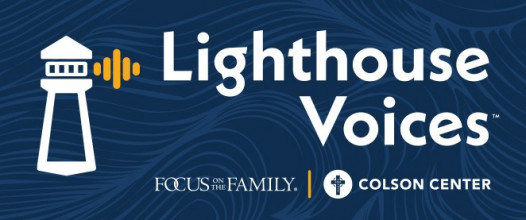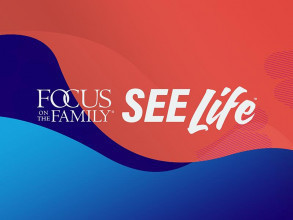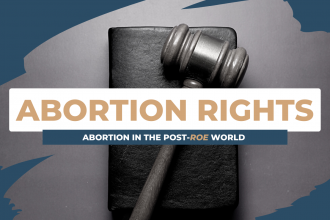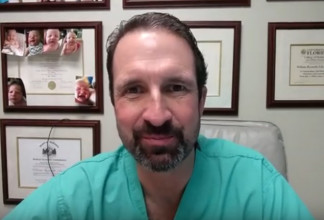
Homemade Meals for Busy Families
Mary Beth Lagerborg, co-creator of Once-A-Month-Cooking, discusses the importance of hospitality and how families can prioritize dinner time by cooking a month’s worth of healthy meals in one session.
Rescue 2x the babies from abortion!
Home » Episodes » Focus on the Family Broadcast » Abortion Pill Reversal
John Fuller: Today on Focus on the Family, we’re tackling a tough subject that won’t be appropriate for younger listeners. So we’d advise you to, uh, have them elsewhere. We’re going to be covering, uh, the matter of the abortion pill. And let’s go ahead and hear from one of our guests.
Rebekah Buell Hagan: I knew I couldn’t go back in there. And I just prayed to God, and I said, “God, if there’s a way out of this, please help me find it. And if not, please help me to forgive myself.” And it dawned on me, and I really think it was no coincidence, that it was in this moment, that I began to really think about this th- the day I took the first abortion pill, was March 13th of 2013. And the following day, the day I was set to complete the abortion, where the pregnancy was supposed to expel, was March 14th. And that was my son Eli’s first birthday. And I quickly realized, “Oh my gosh, March 14th will forever be a day that I literally brought one baby into this world and took another one out.” And it was that thought that made me think, “You have to do something different. You have to go back. You have to find a way out of this.”
John: That’s Rebekah Buell Hagan, and you’ll hear more of her story today on Focus on the Family. Your host is Focus president and author Jim Daly. And I’m John Fuller.
Jim Daly: John, we’re returning to a program we shared in 2020 with Dr. Bill Lile and Rebekah Hagan, because it is so important right now. The landmark Dobbs decision overturning Roe v Wade is definitely worth celebrating. But we still have so much to do to protect life and to care for the people in situations where abortion seems to be the only available option – so they think. If you’re in that position, you may be fearful and confused about what to do. There’s so much rhetoric in the culture right now. Here at Focus on the Family, we hope to be a beacon of wisdom, reason, and truth for you. And let me urge you to give us a call. We have caring Christian counselors and many other resources to help you make an informed decision that will honor life.
John: Yeah, we’re a phone call away. Our number is 800, the letter A, and the word FAMILY. 800-232-6459.
Jim: At the top of the program, you heard a small portion of Rebekah’s story. And I know you will be intrigued by what she has to share. Dr. Lile, uh, fills in some of the gaps, describing more about the abortion pill and the medical aspects of the procedures. Uh, let’s dive in, then we’ll come back for an update from Dr. Lile on what the pro-life landscape looks like now after, uh, Roe v Wade.
John: And Rebekah Buell Hagan is a pro-life advocate and speaker. And, uh, she’s the mom to four. Dr. Bill Lile is an OB-GYN and a staunch advocate for pro-life values. And Jim, we’ll begin, as you asked Rebekah to share her rather heart-wrenching story on today’s episode of Focus on the Family.
Jim: Let’s start with you, uh, and your story. You grew up in a Christian family, but ended up, uh, pregnant at the age of 17. Describe what that situation, what that circumstance was like. You’re in a Christian home at that point.
Rebekah: I was. And, you know, despite being Christians, and despite my parents being on the Worship Team, we never talked about relationships or abortion. And so it was quite shocking to find out, A, that I’m pregnant, and then thinking, B, what do I do next?
Jim: Was there a reason for that in your home?
Rebekah: There actually was. And I didn’t realize that it was rooted in such deep shame. But my mom had actually been forced to have three abortions.
Jim: Yeah. And that’s tough. Um, you chose to give life to your child. And you married your boyfriend. But he was abusive and abandoned this little family that you started at 18. Correct?
Rebekah: Right.
Jim: And I think you discovered you were pregnant once again after you’d broken up with your husband. Is that right?
Rebekah: You’re absolutely right. This all happened in really, um, less than a year. So I delivered that baby, turned 18, got married, the relationship, uh, turned very abusive and dissolved. And right at that time, found out I was pregnant again.
Jim: Can I ask you, Rebekah? Because, uh, you know, we’re going through the kind of the clinical aspects of this. But what were you feeling and thinking? I’m sure there may be a 17-, 18-, 19-year-old that’s listening now. And she’s in that spot. Connect with her: what were your emotions like at the time?
Rebekah: I was terrified. I knew now how hard it was to have a child, and to be a single mom. I was scared of letting my family down. And I thought, really, in a moment of panic and fear, that abortion was my only way out of this. It was the only option.
John: Hm.
Jim: So you had no real support in that way. So you find out you’re pregnant with your second child. And you’re agonizing over that decision. What happened?
Rebekah: So basically, from the moment I found out I was pregnant, which I took that pregnancy test at a grocery store bathroom-
Jim: Hm.
Rebekah: alone-
Jim: Wow.
Rebekah: uh, before even walking out of that grocery store, knew I had to have an abortion.
Rebekah: And so like so many young girls do, I turned to the internet on my phone, and typed in “abortion clinics near me.”
Jim: Hm.
Rebekah: Also learned about, um, medication abortion. And found out how it was marketed as easy and convenient and cheaper. Easier to hide, less painful, overall less invasive. And so immediately sought out a medication abortion.
Jim: Man. Uh, Bill, you’re the doctor. W- what is that medication abortion?
Dr. Bill Lile: The medication itself is called mifepristone, also known as RU486. And it is a very effective blocker of a hormone called progesterone. Progesterone, if you break that word down … pro-gesterone, pro-gestation … this is the conductor of the orchestra of pregnancy, that organizes everything and says, “Our new full-time job is supporting this pregnancy.” RU486 blocks that signal, separates the pregnancy from the mother, and then allows for the cervix to open up and the uterus to contract, and the baby is passed away and is delivered.
Jim: Yeah. I mean, and unfortunately, usually in your home, in the bathroom.
Dr. Lile: Correct.
Jim: In a toilet. I mean, that’s the truth. Uh, Rebekah, I want to return to your story. Uh, you were determined to get the abortion. You’re in this dark place. Thank you for sharing that.
Rebekah: Absolutely.
Jim: Um, you took the first pill. And what happened?
Rebekah: I did. So I took that first abortion pill, and I remember th- sitting there in a- a Planned Parenthood clinic, and I started to kind of tear up. And the nurse practitioner that was giving me the first abortion pill, said, “You know, Rebekah, just because you’re sad, doesn’t mean you’re making the wrong decision.”
Jim: Hm.
Rebekah: And right before I took it, she said, “But once you do this, there’s no going back.” And I just said, “Okay.” So I took that first pill. And by the time I got to my car, which maybe only took, you know, 90 seconds or so, it was like everything hit me. And the best way I can describe a person that is making the decision to have an abortion, what goes through her mind, is you’re walking down this path and it seems well lit. It seems illuminated. And all of a sudden, you, uh, make this turn. You make that choice. And it’s like all of that light goes out. And you realize that it was actually Satan, and he says, “Gotcha.”
Jim: Hm.
Rebekah: And that’s how I felt when I got to my car. I was looking at that second set of medication. It was like Satan said, “Gotcha. And now you know pain, and now you know grief, and now you know what it’s really like to regret, uh, having just had an abortion and taking the life of your child.”
Jim: Wow. You have said so much there, so well. The emptiness of that.
Rebekah: Absolutely.
Jim: I mean, feeling like, “What have I done?”
Rebekah: Right. And people, abortion providers especially, make it seem like no woman ever goes into this underinformed. Very few women ever regret their decision or change their mind. And it’s just simply not the truth.
Jim: Right. It’s propaganda.
Rebekah: Right.
Jim: To make the machine work for them. How did God reach your heart? I mean, you beautifully described the sense that you were going down the road to darkness, taking the life of your child. How did God grab you?
Rebekah: While I was still sitting in my car outside of this abortion clinic.
Jim: Yeah.
Rebekah: I knew I couldn’t go back in there. And I just prayed to God, And I said, “God, if there’s a way out of this, please help me find it. And if not, please help me to forgive myself.” And it dawned on me, and I really think it was no coincidence, that it was in this moment, that I began to really think about this: th- the day I took the first abortion pill, was March 13th of 2013. And the following day, the day I was set to complete the abortion, where the pregnancy was supposed to expel, uh, was March 14th. And that was my son Eli’s first birthday.
Jim: Hm.
Rebekah: And I quickly realized, “Oh my gosh, March 14th will forever be a day that I literally brought one baby into this world and took another one out.” And it was that thought that made me think, “You have to do something different. You have to go back. You have to find a way out of this.”
Jim: And what did you do to find your way out – practically?
Rebekah: After praying, which I (laughs) highly recommend before turning to Google, right? I did turn to the internet, and I started typing in things like, “I took the first abortion pill, and I changed my mind.” And after a while, it seemed women just like me post similar questions. I found the hotline number.
Jim: Oh, that’s fantastic.
Rebekah: It was. And when I called, I spoke to a nurse of a pregnancy center in San Diego, which was about eight hours away from me in Sacramento. And she was calm, and, uh, responsive and asked me questions that the abortion provider never did. Like, “How did you get here?” And “Why did you think this was your only option? What is your home life like? Your spiritual life like? And then, why have you now changed your mind?” And then she started talking to me about abortion pill reversal.
Jim: Powerful. I’m tearing up here.
Rebekah: Ah.
Jim: I’m sorry; I’m just going, “Wow.” This is good!
Rebekah: It was amazing. Uh, it was one of those moments where you look back and you know she was led by the Holy Spirit. It was a- an ordained conversation. And what I didn’t even realize was that throughout this whole process, I wasn’t even told what the abortion pill actually did to my body. I wasn’t actually told that 24 hours later, I was going home to take a medication that women are given when they’re in active labor. I was so frustrated that I was so misled and underinformed-
Jim: Hm.
Rebekah: uh, that now she became the person I could trust.
Jim: This is your go-to person.
Rebekah: Right.
Jim: Which is beautiful; that’s how it should work. Right?
Rebekah: Right.
Jim: Bill, what is that reversal medically? What’s going on there to better inform women-
Dr. Lile: Sure.
Jim: and their husbands?
Dr. Lile: Well, the RU486 blocks the hormone progesterone. We actually reverse that by supplementing with more progesterone and overwhelm the body. So the woman’s body will, at first, say, “Hey, we’re pregnant.” And they’re giving the RU486, and then there’s the- the signal is lost. And the body says, “Well, I guess we’re not pregnant.” Well, then we give more progesterone. And the body response is, “No, it’s okay. We are pregnant.” And so all the support for the pregnancy is then re-established.
Jim: And to Rebekah’s point, what is that window of time?
Dr. Lile: Sooner is better. We have been very effective within the first 72 hours. In fact, our success rate of reversing an abortion pill is about 70%, if we can initiate reversal therapy within the first 72 hours. And this is- it can be a pregnancy up to 10 weeks, which is very different from the morning-after pill, which is 72 hours. This is 70 days from the first day of the last menstrual period.
Jim: Yeah. That is so good. Uh, John, uh, let people know how they can get ahold of us-
John: Yeah.
Jim: at the website.
John: Yeah, as you’re listening, you’re thinking, “I really want that website.” Uh, stop by ours, and we’ll link over to all the details. And, uh, it’s focusonthefamily.com/broadcast. Our number is 800, the letter A, and the word FAMILY.
Jim: Rebekah, folks are thinking, “Okay, where is she at today? What happened?” Uh, describe your family.
Rebekah: Sure. So, thankfully I did take the advice of that nurse. We found a physician, stayed on the progesterone reversal regimen that Dr. Lile just talked about. And maintained a healthy pregnancy, a full 40 weeks.
John: Hm.
Rebekah: And delivered another little boy. And he, despite what the abortion clinic told me, that he would have, uh, severe abnormalities or that I would probably miscarry, he’s perfectly healthy. And his name is Zachariah, which means “the Lord remembers.” Because clearly, as I look back on this story, um, in our experience, I see God’s hand over it all.
Jim: Mm-hmm. Fantastic. And now you have no regrets.
Rebekah: Absolutely not. I am so thankful for abortion pill reversal, and for the physicians and the nurses that went before me and made it possible for our story to have ended this way.
Jim: Yeah. Uh, Bill, um, your passion in this space is wonderful. But let’s take a moment and deconstruct the arguments of the other side.
Dr. Lile: Sure.
Jim: When they talk about it being safe, and it being simple, and no regrets: everything that Rebekah just shared. What do you see in your practice from women, perhaps who’ve had an abortion in their background? What is the truth of what women experience?
Dr. Lile: This is a medical induction of a miscarriage, where the support for the pregnancy is taken away, and then contractions are forced onto the woman’s body.
Jim: Boy.
Dr. Lile: So the pain from the contractions is intense. The bleeding is there. The clotting. And usually, just like you had said, they are home, they are alone, they might be in their dorm, they might be in their bathroom. It’s a miserable experience, which is why a lot of this medication is given out at the end of the week. The clinics are closed on the weekend.
Jim: Mm-hmm.
Dr. Lile: There’s nobody to call.
Jim: Wow!
Dr. Lile: And by the time Monday rolls around, everything has already been done.
Jim: Yeah. Can there be further complications in that moment? I’m thinking of a couple of women’s testimonies that I’ve heard, where you can have things go wrong in that private moment, after you’ve taken the additional medication.
Dr. Lile: Sure. There can be excessive bleeding, hemorrhaging, complications, in addition to the pain that is there. And when they’re experiencing that, there’s nobody to turn to. There was a psychological article that was part of the Journal of Obstetrics and Gynecology; this was January of this year. And they looked at women who had had either a first-trimester miscarriage or a first-trimester ectopic pregnancy. One month after that experience, 28% of them had classic defined PTSD from that experience.
Jim: Hm.
Dr. Lile: Nine months later, 18% of those women still had classic PTSD symptoms from that miscarriage. These were events where they did not choose to have this, but they still had the psychological impact of the loss of that pregnancy. With this, this is a women’s health issue. Physically, yes, but also mentally, yes. Because if somebody is having these sort of symptoms nine months later, then with a miscarriage or an ectopic pregnancy, surely when they have made the decision to cause this loss of life, they’re going to be having similar symptoms.
Jim: I mean, that is so profound. And, uh, you know, the goal here is to value life. In this culture, unfortunately, and globally, because of the work of Planned Parenthood and other abortion industry, uh, clinics, I mean they- they’re convincing women that this is the way to go. And it’s so unfortunate, because what you see on the other side is a lot of misery.
Jim: And of course, then they attack us, like Focus on the Family-
Dr. Lile: Correct.
Jim: and say that “If you didn’t put that stigma on these women, then there wouldn’t be a problem.” It’s kind of like saying, “If you wouldn’t allow the Holy Spirit to convict, everything would be fine.” Well, sin is not fine. And forgiveness is the goal.
Dr. Lile: Yes.
Jim: And, you know, we need to recognize that and be bold enough to talk about that. God doesn’t condemn women who are in terrible positions, often being influenced by their husband or boyfriend to get the abortion; that’s a common pattern. And so, we’re all guilty as a culture: that we’re not doing enough to wake the culture up and say, “This is about protecting babies.”
Dr. Lile: Mm-hmm.
Jim: These are human beings. And may God bless you for your efforts. As I’ve said before, Rebekah, God bless you for that decision you’ve made. Thank you both for being with us today.
Dr. Lile: It’s been a pleasure.
Jim: Yeah. Thank you.
Rebekah: Absolutely.
John: That’s Rebekah Buell Hagan and Dr. Bill Lile today on Focus on the Family. And we trust you’ve heard their heart – our heart – uh, and our desire to help women and men who might be facing an unexpected or unplanned pregnancy.
Jim: Well, John, as you heard Rebekah’s story, those, uh, are powerful stories. And she’s not alone. There are so many stories like hers. Uh, children are a gift from God. And we’ve gotta change this idea in the culture that they’re disposable.
John: Yeah.
Jim: And, uh, it’s one of the things I know our guest fights each and every day. And here at Focus on the Family, we do the same through Option Ultrasound, in trying to save as many babies as we can together. And just because Roe v Wade, uh, was overturned, it doesn’t mean the battle is over. It really has put the battle into all 50 states, and, um, magnified the battle in some ways. There’s just no federal constitutional right to an abortion. And, uh, you know, we’ve got to be able to respond accordingly. Uh, since that momentous decision came down from the Supreme Court in June of this year, we’ve seen widespread panic from some in the culture. You know that this is the end of it. And there’s so much disinformation in the culture, that I’m glad we have Dr. Lile here to help, uh, clear up some of these misconceptions. Uh, Dr. Lile, it’s great to have you with us. Thank you for joining.
Dr. Lile: Well, I thank you very much. It’s a privilege to be back.
Jim: You did, uh, such a, uh, magnificent job in that broadcast, just bringing the medical, uh, expertise and the observation of being a doctor, a scientist, into that. Uh, and describing the abortion pill and its impact – and the reversal. And now that the Supreme Court recognized that abortion is not a constitutional right, it’s up to the states to decide, like I just said. Uh, some states have banned the procedure completely, like Texas, Louisiana, Idaho, and several others. But Plan C, the self-managed at-home abortion pill, is on the rise. That’s, I think, one of the more used abortion methods right now. In fact, people order that online because in some states, that’s completely legal. And they don’t even have to see a doctor. Am I describing that correctly?
Dr. Lile: You are. And one of the things we need to define and educate is the difference between the morning-after pill, which is evil, and the abortion pill. The morning-after pill is indicated for the morning after a woman has had intercourse. The abortion pill is very, very different because it should really be called the 70-morning-after pills. Because it is indicated to kill a baby in the womb up to 10 weeks gestation: 70 days. It’s very different. 98% of the time, it will kill a baby in the womb. And this is a baby with a heartbeat that has arms and legs that are moving, that you could see on ultrasound. And that is the level of evil when we can now have that sent mail order, from a virtual visit where they never even met the physician. They never even had an exam, and they never had an ultrasound. And that is where we are. Prior to the pandemic, 39% of all the abortions were performed with the abortion pill. Now that number is 54% nationwide.
Jim: Well, and you’ve led the way in so many ways. One of those is, uh, the pill reversal website, the hotline, which are great resources. And your medical expertise, again, backing that. In fact, on the website, uh, John, there’s a chat box for immediate assistance and there’s 24/7 help.
John: Mm-hmm.
Jim: So a woman can always get access to that. And we’ll have that information, uh, I think on the episode page.
John: Right on the website.
Jim: Uh, for those listening, Bill, who can’t go that episode page right now, how can they get help if they’re hearing this, and a woman’s saying, “I need to talk to somebody.” How would they do that?
Dr. Lile: Sure. Well, if they’ve already taken the first pill of the abortion pill cocktail, they can contact our website, which is abortionpillreversal.com. That will put them in touch with a nurse at our hotline, who can connect them with an OB-GYN in their area to assist them. An abortion is not healthcare. And we are here to assist women to have a healthy mom and a healthy baby. Because there are side effects to abortion. There are side effects to the abortion pill. There are side effects to the, uh, surgical abortion. In fact, if a woman has a surgical abortion, she has increased her risk of having a pre-term delivery with a subsequent pregnancy by 35%. If she’s had two surgical abortions, she has increased that risk of delivering a future baby by 90%. So there are risks. And we want healthy moms, and we want healthy babies as OB-GYNs.
Jim: That’s so true. You know, a common question in light of the Dobbs decision, Bill, is if, uh, the Supreme Court’s ruling impacts women who experience, I- I guess what- how I would call it is just natural things that occur in a pregnancy: ectopic pregnancy, et cetera. Uh, miscarriages that, uh, coming from nature, not from a decision to terminate the baby’s life. Make that distinction for us, and the fact that m- most states still, if not all states, will cover those kind of medical emergencies.
Dr. Lile: Sure. Well, let’s talk miscarriage first. My wife and I have two beautiful daughters. We suffered through four different miscarriages. If a woman has an incomplete miscarriage and is scheduled for a D&C by her physician, in no way is that an abortion. Abortion is done when there is a heart beating on that baby on the inside. Regarding ectopic pregnancies: there’s also a lot of fake news out there that these laws that are protecting the lives of babies in the womb are gonna prevent women from getting access to healthcare when they have an ectopic pregnancy. The number one pregnancy-related killer of women in the first trimester of pregnancy here in the United States is still a ruptured ectopic pregnancy. And an ectopic pregnancy is when, yes, there’s a positive pregnancy test. Yes, there is a pregnancy. But it is not in the lining of the uterus where it should be. But it has landed outside the lining of the uterus. The most common place is in the fallopian tube. And we need to surgically do a procedure to save the life of that mom. That is only because we are trying to save the life both, but we can’t save the life of the baby. So we must save the life of the mom. And when we do that, that is not an elective abortion. Mom did not choose that. That’s also one of the dangers of the abortion pill. When the abortion pill is prescribed because of a virtual visit, there’s a positive pregnancy test, and the mom is just guessing how far along she is. But she does not know, number one, how far along she is in the pregnancy. But she also does not know where that pregnancy is. And 1% of the time, that pregnancy will be in the tube instead of within the uterus. And if she takes the abortion pill, she’s told, “You’re gonna have bleeding, cramping, and pain.” Well, guess what the symptoms of a rupturing ectopic pregnancy are? The exact same symptoms: bleeding, cramping, and pain. And we have already had cases reported where girls have had a virtual visit. The abortion pill cocktail has been mailed to them. They have taken the abortion pill. And then they have had bleeding, cramping, and pain. And then they have been found dead, because they’ve had a ruptured ectopic pregnancy because they were denied an ultrasound to see, number one, how far along they were. And number two, where that pregnancy is. That is not healthcare. Abortion risks the lives and health of mother. But abortion primarily takes the life of a healthy baby. A healthy baby created in the image of God, not when they’re born, but at that moment of conception. So we’d be happy to debate somebody who denies what the truth is.
Jim: Sounds like an open invitation, Dr. Bill Lile.
Dr. Lile: Absolutely.
Jim: Thank you so much for being with us. Appreciate your time.
Dr. Lile: You’re welcome, my brother. And God bless you all.
Jim: And also, let me remind you to stand firm. Uh, you heard Bill Lile there, Dr. Bill Lile. Don’t cower to what people are trying to tell you: uh, especially when it’s false.
John: Mm-hmm.
Jim: What a great resource Dr. Lile is. And, uh, you can get more information right from us here at Focus on the Family. As I said, there’s still so much to be done to protect life and care for those women in those situations of difficult pregnancy, and those decisions that come with it. And one of the things here at Focus on the Family, we’ve done I think a good job with Option Ultrasound. I think we’re nearing 500,000 babies saved through that effort. And that’s really placing training and services in these, uh, pregnancy resource clinics, along with, uh, machines. The ultrasound machines that actually give a woman the opportunity to see her baby in her womb. And that can change the mind of that woman-
John: Mm-hmm.
Jim: especially the abortion-minded women. And we need to expand that program. That’s what I’m hoping for. I believe the Lord has given me that insight to say, “Okay, how do we make the pregnancy resource clinic the champion in that community, and provide a plethora of resources and, uh, kind of creative ways to help that woman? Such as job training, job placement through the Christian business community. Uh, working with hospitals to provide, hopefully, reduced or free medical services for these women. We’re gonna try to do that state by state. And I hope you’ll consider, uh, joining us in that effort to provide even more help to these women who are desperate and not knowing what to do.
John: Yeah, we’re expanding our efforts, uh, at a local level. And we need your help to do that. It takes just $60 to save a baby’s life, and to support a mom and a dad. Um, so please, step up, donate today as you can, at focusonthefamily.com/broadcast. Or call 800, the letter A, and the word FAMILY. 800-232-6459.
Jim: Uh, John, also for all of us to know this, that 80% of post-abortion women said they would have considered keeping the baby if one person would have come alongside them. And I think that’s what we’re suggesting: can we, together, be that person that comes alongside that woman to help her?
John: Hm.
Jim: And to make a decision for life? And then be there for her? Uh, the Christian community has done that for centuries. And we’re not gonna stop now. So, consider joining us in this effort.
John: Yeah, you can do that through a pregnancy center. You can do that by opening your home. Jim, we have had colleagues here who, uh, opened their home and support that young lady in that time of need.
Jim: Hm.
John: Uh, we can all do something. And so please, prayerfully consider what you can do. And if you can join us, donate today to, uh, support the Option Ultrasound effort here at Focus on the Family. On behalf of Jim Daly and the entire team, thanks for listening today to Focus on the Family. I’m John Fuller, inviting you back as we once more help you and your family thrive in Christ.

Dr. William Lile is board certified in obstetrics and gynecology. He has served as a hospital OB/GYN Department Chair and as an instructor with both the University of Florida and Florida State Medical School OB/GYN residency programs. A passionate pro-life advocate, Dr. Lile took over a practice that was the largest provider of abortion services in Pensacola, Fla., and immediately put an end to those services. He is part of a nationwide network of 500 physicians who voluntarily perform abortion pill reversals and serves as a medical adviser for the Florida Human Life Protection Amendment. Learn more about Dr. Lile at his website, prolifedoc.org.

Your gift will equip pregnancy medical clinics across the country with ultrasound machines, resources and nurses' sonography training so abortion-vulnerable mothers can see their babies and be moved to choose life. Every $60 you donate will help save the life of one pre-born baby through our Option Ultrasound program.

Have you taken the first dose of the abortion pill? Do you regret your decision and wish you could reverse the effects of the abortion pill?

Join us on October 4th at 7:00pm EST in person or by livestream to hear from Alexandra DeSanctus on "Tearing Us Apart: How Abortion Harms Our Culture and Disadvantages Women.

Visit our online store and purchase a CD of today's program for yourself or to share with a friend.

Learn how you can join pro-life champions - including Ben Shapiro and Candace Owens. Together we’ll worship, pray and get equipped to live out our pro-life values.

What teen girls and women need to know about reversing a medical abortion.

An explanation of the abortion pill reversal process.

Abortion rights have not stopped. But, citizens can now vote on the issue - something Roe v. Wade didn’t allow.

Dr. Bill Lile poses this question: if a fetus can have surgery and survive, doesn’t that make him or her a patient? And isn’t a patient a person? In this fast-moving presentation, Dr. Lile outlines the medical aspects of the pro-life position. He describes the moment of conception, the life-saving benefits of fetal surgery, and the benefits of ultrasound technology.

Dr. Bill Lile shares amazing details about what happens in a woman's womb during conception.

Rebekah Hagan offers words of hope to weary pro-life advocates who feel discouraged that their efforts may be in vain.

Dr. Bill Lile explains the important distinction of identifying babies in the womb as "pre-born" and not "un-born."

Mary Beth Lagerborg, co-creator of Once-A-Month-Cooking, discusses the importance of hospitality and how families can prioritize dinner time by cooking a month’s worth of healthy meals in one session.

Scott Klusendorf, President of The Life Training Institute and Robyn Chambers, Vice President of Advocacy for Children at Focus on the Family, share strategies and encouragement in the pro-life movement. They offer compassion for abortion-minded women and speak up for pre-born babies. (Part 2 of 2)

Scott Klusendorf, President of The Life Training Institute and Robyn Chambers, Vice President of Advocacy for Children at Focus on the Family, share strategies and encouragement in the pro-life movement. They offer compassion for abortion-minded women and speak up for pre-born babies. (Part 1 of 2)

Larnelle Harris shares stories about how God redeemed the dysfunctional past of his parents, the many African-American teachers who sacrificed their time and energy to give young men like himself a better future, and how his faithfulness to godly principles gave him greater opportunities and career success than anything else.

Amy Carroll shares how her perfectionism led to her being discontent in her marriage for over a decade, how she learned to find value in who Christ is, not in what she does, and practical ways everyone can accept the messiness of marriage and of life.

Jonathan McKee offers parents practical advice and encouragement in a discussion based on his book If I Had a Parenting Do Over: 7 Vital Changes I’d Make.